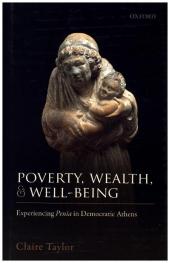 Neuerscheinungen 2017Stand: 2020-02-01 |
Schnellsuche
ISBN/Stichwort/Autor
|
Herderstraße 10
10625 Berlin
Tel.: 030 315 714 16
Fax 030 315 714 14
info@buchspektrum.de |

Claire Taylor
Poverty, Wealth, and Well-Being
Experiencing Penia in Democratic Athens
2017. 336 S. 13 black-and-white illustrations. 223 mm
Verlag/Jahr: OXFORD UNIVERSITY PRESS 2017
ISBN: 0-19-878693-X (019878693X)
Neue ISBN: 978-0-19-878693-1 (9780198786931)
Preis und Lieferzeit: Bitte klicken
In fifth- and fourth-century BCE Athens ´poverty´ encompassed not only destitution, but also the need to work for a living. This volume considers what it meant to be poor in this sense, arguing that it should be understood not just as an economic condition, but also in terms of social relations, capabilities, and well-being.
Poverty in fifth- and fourth-century BCE Athens was a markedly different concept to that with which we are familiar today. Reflecting contemporary ideas about labour, leisure, and good citizenship, the ´poor´ were considered to be not only those who were destitute, or those who were living at the borders of subsistence, but also those who were moderately well-off but had to work for a living. Defined in this way, this group covered around 99 per cent of the
population of Athens. This conception of penia (poverty) was also ideologically charged: the poor were contrasted with the rich and found, for the most part, to be both materially and morally deficient.
Poverty, Wealth, and Well-Being sets out to rethink what it meant to be poor in a world where this was understood as the need to work for a living, exploring the discourses that constructed poverty as something to fear and linking them with experiences of penia among different social groups in Athens. Drawing on current research into and debates around poverty within the social sciences, it provides a critical reassessment of poverty in democratic Athens and argues that it
need not necessarily be seen in terms of these elitist ideological categories, nor indeed solely as an economic condition (the state of having no wealth), but that it should also be understood in terms of social relations, capabilities, and well-being. In developing a framework to analyse the complexities of poverty so
conceived and exploring the discourses that shaped it, the volume reframes poverty as being dynamic and multidimensional, and provides a valuable insight into what the poor in Athens - men and women, citizen and non-citizen, slave and free - were able to do or to be.
[T]his is a complex book, which needs to be read carefully. It has the merit of taking a broader, multidimensional approach to the concept of poverty and wealth, providing a critical opinion on being poor in Athens in the 5th and 6th centuries BCE. Furthermore, it suggests an approach to the documentation that makes it possible to rethink the literary sources from a different point of view (the non-elite), and so acquire new ideas for reflection. The bibliography is far reaching and up to date; the publication is accurate and tidy. Bryn Mawr Classical Review
Claire Taylor is the John W. and Jeanne M. Rowe Associate Professor of Ancient Greek History at the University of Wisconsin-Madison. Her publications include Communities and Networks in the Ancient Greek World (OUP, 2015), co-edited with Kostas Vlassopoulos, and Ancient Graffiti in Context (Routledge, 2011), co-edited with J. A. Baird. In addition she has published on various topics related to Athenian democracy, women´s social networks, and
epigraphic evidence as a source for ancient history.


